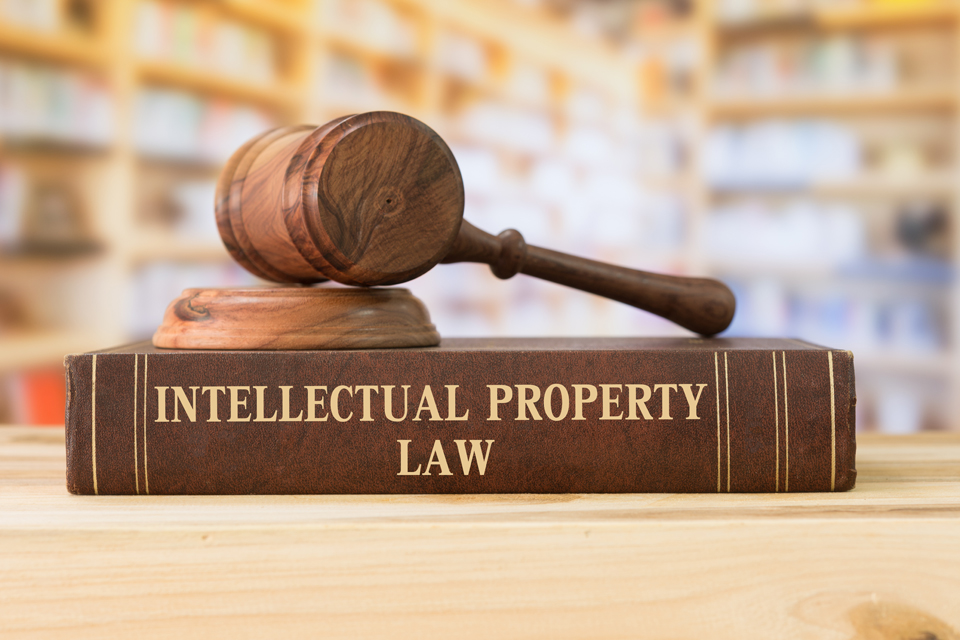
The intellectual property attorney conquers both challenges. They help clients apply for intellectual property registration and litigate its infringement in state and federal courts.
Intellectual Property
Black's Law Dictionary defines intellectual property as:
"A category of intangible rights protecting commercially valuable products of human intellect. The category comprises primarily trademark, copyright, and patent rights, but also includes trade-secret rights."
The U.S. Constitution, in Article I, Section 8, Clause 8 protects a person's intellectual property:
"To promote the Progress of Science and useful Arts, by securing for limited Times to Authors and Inventors the exclusive Right to their respective Writings and Discoveries."
Patents
Whoever improves, invents, or discovers a new and useful process, the machine, or similar, may obtain a patent for it. There are three types of patents:
- Utility – a new and useful process, machine, article of manufacture or composition of matters, or an improvement upon an existing one.
- Design – a new and original design for an article of manufacture.
- Plant – an invention or discovery and asexual reproduction of a distinct new variety of plants.
The United States Patent and Trademark Office (USPTO) processes applications for patents. The application consists of several steps:
- Research whether the invention has been publicly disclosed (e.g., in a research paper or symposium). If so, it can't be patented.
- Conduct a preliminary search to determine if the invention is already patented.
- Determine what type of patent (utility, design, or plant).
- Fill out the online application.
Once the patent is applied, a USPTO examiner reviews the submittal and determines whether the invention or discovery is patentable. If so, the applicant receives a Notice of Allowance and an official patent grant after several weeks.
Copyright
A copyright provides protection "in original works of authorship fixed in any tangible medium of expression, now known or later developed, from which they can be perceived, reproduced, or otherwise communicated, either directly or with the aid of a machine or device."
The author of the work is granted exclusive rights to use and distribute their original works, such as literature, music, artwork, and sound recordings.
Although copyright is established for work at the time, it is fixed in a tangible medium. Many people register them with the United States Copyright Office (USCO) because registration gives the copyright holder the legal right to act against those who infringe on it.
Applications are filed with USCO, and if approved, the author receives a certificate of registration.
Trademarks
There are two bodies of trademark law – federal law and common law.
Federal Trademark Law
USPTO provides the following definition of trademark: a "word, phrase, symbol, or design, or a combination thereof, that identifies and distinguishes the source of the goods of one party from those of others."
Federal registration of a trademark with USPTO allows the holder to protect it in federal court legally.
Common-Law of Trademarks
There is a rich tradition of common law protection for trademarks, usually part of the state's unfair competition law. The specific law in each state varies, but most are based on either the Model Trademark Bill or the Uniform Deceptive Trade Practices Act.
Trade Secrets
A trade secret consists of three elements:
- Is the information of independent economic value due to it being generally unknown;
- It has value to those who cannot legally obtain the information; and
- The information is protected using reasonable efforts to maintain its secrecy.
Unlike patents, copyrights, and trademarks, there is no registration, federal or otherwise, of trade secrets. However, three bodies of law protect them:
- A common law tort action for misappropriation.
- Statutory protection, usually in the form of a version of the Uniform Trade Secrets Act.
- Recent federal protection under the Economic Espionage Act of 1996 and the Defend Trade Secrets Act of 2016.
This protection includes the possibility of criminal action against those who misappropriate trade secrets.
A recent example of state action is Hughes v. AGE Industries, Ltd. In Hughes, AGE Industries manufactured cardboard boxes and packing materials. One of its employees, Michael Hughes, had worked for the company for nearly 20 years when he resigned and joined a competitor in cardboard manufacturing. He allegedly took trade secrets with him to his new employer. This case illustrates a common set of facts in a trade secret misappropriation claim.
Career Opportunities for Intellectual Property Attorneys
There are two main career paths for an intellectual property attorney. The first revolves around the acquisition of patents, copyrights, or trademarks from the federal government. The second path is that of litigation – pursuing or defending claims of infringement. Other career paths include working at USPTO or USCO as a trial board judge or becoming a law professor.
Intellectual Property Acquisition
The intellectual property registration or certification process with the federal government is very involved. Most people hire a lawyer specializing in this field. Any lawyer in good standing can represent someone with a copyright or trademark application. However, for a person other than the inventor to apply for a patent, the person must be a registered patent agent or registered patent attorney.
A registered patent attorney must have an educational background in engineering or the sciences and pass the patent bar, a notoriously difficult test.
Often, an application with USPTO or USCO is rejected. In this case, the intellectual property attorney can appeal the rejection to the appropriate appeals board. The patent application appeal process is discussed, but the procedures and forums for copyrights and trademarks are similar.
The Patent Trial and Appeal Board (PTAB) hears appeals from adverse examiner decisions.
An applicant for a patent, whose application has been rejected twice by a patent examiner, may appeal to the PTAB.
The intellectual property lawyer helps the applicant with their claim by:
- Filing a Notice of Appeal.
- Drafting an appeal brief within two months of filing the Notice of Appeal. This brief must be submitted to preserve the appellant's rights.
- Responding to the Examiner's Answer. This consists of filing a brief within two months of the examiner's response.
- Attending oral argument before the PTAB.
If the PTAB appeal is denied, the appellant may file for an appeal with the United States Court of Appeals for the Federal Circuit. This unique court has nationwide jurisdiction. While it hears international trade disputes, money claims against the federal government, and other issues, over two-thirds of its workload consists of intellectual property cases. The intellectual property attorney represents their client in proceedings before the Federal Circuit.
Intellectual Property Litigation
Over 12,000 intellectual property cases are filed in federal district court each year. Many of them have to do with infringement. Again, patents are discussed, but the process is similar for copyrights and trademarks.
Patent holders have exclusive rights to using or selling their inventions. They can file a lawsuit against those who infringe on their patents for two reasons – to recover damages and obtain an injunction against further infringement. There are two elements to a patent infringement claim – ownership and validity of the patent.
The intellectual property attorney either initiates a claim against the defendant accused of infringement or represents the defendant against the infringement claim.
Appeals to the district court's decision are heard before the Federal Circuit.
Additionally, the intellectual property lawyer may litigate trade secret tort claims in state court.
Law School Professor
Another avenue for a seasoned intellectual property lawyer is to become a law professor. A stellar academic record, judicial clerkship, and extensive experience are helpful in this endeavor.
Many law schools offer LLMs in intellectual property. George Washington University Law School, for example, has offered an LLM in patent law since 1895. Law professors experienced in intellectual property are needed to teach these LLM programs.
How Do I Become an Intellectual Property Attorney?
The practice of intellectual property law can be highly technical. A bachelor's degree in engineering or the sciences is beneficial. In addition to a law degree and bar membership, an LLM in intellectual property is also beneficial for this career choice.
Essential Skills for an Intellectual Property Attorney
There are certain skills that a patent attorney must possess. These skills are expected to be exhibited by future employers.
1. A review of prior art, patent landscapes, and other reports
Developing this skill is essential for young IP lawyers. Prior art searches can take different forms. Depending on the situation, the objective may be to determine whether an invention is patentable or to invalidate someone else's patent. State-of-the-art reports may be requested to help R&D teams identify which patents exist and which inventions to target. Before launching a new product, lawyers are required to draft a freedom-to-operate report, which is mandated by clients to avoid infringement lawsuits, product recalls, and launch delays.
2. Providing legal advice and assistance to executives in forming their business strategies
In a knowledge-based economy, IP is crucial. In-house IP experts or external counsels can provide timely IP advice to business leaders. During this stage, the lawyer's business acumen becomes even more crucial.
3. Specialized skills for the USPTO
One of the most influential IP authorities and registrars in the world is the United States Patent and Trademark Office. You can have a great deal of success in your IP law career anywhere in the world by learning and gaining USPTO-specific skills. In addition to the USPTO, EPO and JPO are also sought after patent offices.
4. Advice and assistance in developing brands
Are you able to help clients with developing trademarks and distinctive trade dresses that will enhance their brand? This is a highly sought-after service. This type of work is immense and ever-growing.
- The availability and protection rights of various trademark phrases and designs need to be explained thoroughly to brand creators and owners.
- Dealing with disputes and domain transfers involving domain names.
- Exploring joint-branding possibilities and negotiating cross-branding agreements.
- Assuring that celebrity image rights are secured for the promotion of brands through brand endorsements.
- Checking e-commerce websites for products and services that may violate and infringe on brands' trademarks.
- Implementing a corporate policy to promote global visibility and brand recognition via electronic distribution of content.
- Managing the prosecution, maintenance, and enforcement of the active trademark. Brands with a global presence can submit registration applications and applications.
5. Negotiation of IP-related deals
Getting a license or an assignment is lucrative. A good lawyer at this work occupies the top of the food chain. You should definitely try to develop these skills and work in areas where such work is involved.
6. Compliance with IP laws
Tech, pharmaceutical, and media companies are also required to have these services before an IPO. Due diligence programs may need to be created for patents, trademarks, copyright, trade secrets, licensing, and confidentiality. The costs of analyzing IP portfolios and creating a detailed report can run into the millions for companies with heavy patent holdings. Intellectual property due diligence is an exciting area for IP lawyers during M&A and investment transactions.
7. Licensing of media and content
In addition to being a rapidly growing industry, media is highly IP-oriented. Lawyers provide the muscle for this battle, as content is king. We are fortunate. The following skills may be useful to you:
- Developing and negotiating domestic and international entertainment distribution deals for traditional media, video on demand, and the Internet.
- Sporting events have evolved into crucial sources of mass advertising through licenses and sponsorships.
- As global content becomes popular on a local level, enforce your copyright globally. What can you do to enforce copyright in a sub-Saharan country or a central Asian kingdom? You may be required to do so.
8. Drafting patent claims, patent applications, and amendments
The task of writing patent claims is a critical one that can prove very costly if done incorrectly. Executives and inventors with extensive experience will only work with highly qualified and proven experts. As a result, if you can build a reputation for drafting good patent applications, which include drafting the claims of the invention as well as amendments, you are likely to find great demand. There is also a good chance that you will attract top packages from IP lawyers. Inventors can file patent applications in their own names even if they are not lawyers. Engineers, scientists, and domain experts are often sought out for their expertise.
9. Preparation and filing of provisional patent applications and design applications
Rarely, top patent lawyers draft provisional patent applications or design applications, and juniors are often the ones who draft them. For this reason, knowing how to draft provisional patent applications and design applications is an important skill for baby IP lawyers. It will help you a great deal if you demonstrate these skills during an internship or interview.
10. Monitoring of grey markets and IP raids
Intellectual property infringements and grey market goods result in massive losses for trademark and patent owners. Also, a major concern is the sale of copyrighted content on the grey market. Market diversification is estimated to cost US brands $63 billion each year.
Grey markets are a huge problem on the web as well as in real life, so companies prioritize the fight against grey market infringement on the internet and in person. IP law firms make good money from IP monitoring services, as well as raiding grey markets to ensure IP owners' rights are protected. For these raids to be successful, Anton Pillar orders or John Doe warrants may be required from local courts.
Read these articles for more information:
- What's the difference between Patent Law, Trademark Law & Other Intellectual Property Practice Areas?
- Careers In Intellectual Property Law
- Intellectual Property Attorney Job Description
- Entry Level Intellectual Property Attorney Jobs - Related Job Titles
About Harrison Barnes
Harrison Barnes is a prominent figure in the legal placement industry, known for his expertise in attorney placements and his extensive knowledge of the legal profession.
With over 25 years of experience, he has established himself as a leading voice in the field and has helped thousands of lawyers and law students find their ideal career paths.
Barnes is a former federal law clerk and associate at Quinn Emanuel and a graduate of the University of Chicago College and the University of Virginia Law School. He was a Rhodes Scholar Finalist at the University of Chicago and a member of the University of Virginia Law Review. Early in his legal career, he enrolled in Stanford Business School but dropped out because he missed legal recruiting too much.
Barnes' approach to the legal industry is rooted in his commitment to helping lawyers achieve their full potential. He believes that the key to success in the legal profession is to be proactive, persistent, and disciplined in one's approach to work and life. He encourages lawyers to take ownership of their careers and to focus on developing their skills and expertise in a way that aligns with their passions and interests.
One of how Barnes provides support to lawyers is through his writing. On his blog, HarrisonBarnes.com, and BCGSearch.com, he regularly shares his insights and advice on a range of topics related to the legal profession. Through his writing, he aims to empower lawyers to control their careers and make informed decisions about their professional development.
One of Barnes's fundamental philosophies in his writing is the importance of networking. He believes that networking is a critical component of career success and that it is essential for lawyers to establish relationships with others in their field. He encourages lawyers to attend events, join organizations, and connect with others in the legal community to build their professional networks.
Another central theme in Barnes' writing is the importance of personal and professional development. He believes that lawyers should continuously strive to improve themselves and develop their skills to succeed in their careers. He encourages lawyers to pursue ongoing education and training actively, read widely, and seek new opportunities for growth and development.
In addition to his work in the legal industry, Barnes is also a fitness and lifestyle enthusiast. He sees fitness and wellness as integral to his personal and professional development and encourages others to adopt a similar mindset. He starts his day at 4:00 am and dedicates several daily hours to running, weightlifting, and pursuing spiritual disciplines.
Finally, Barnes is a strong advocate for community service and giving back. He volunteers for the University of Chicago, where he is the former area chair of Los Angeles for the University of Chicago Admissions Office. He also serves as the President of the Young Presidents Organization's Century City Los Angeles Chapter, where he works to support and connect young business leaders.
In conclusion, Harrison Barnes is a visionary legal industry leader committed to helping lawyers achieve their full potential. Through his work at BCG Attorney Search, writing, and community involvement, he empowers lawyers to take control of their careers, develop their skills continuously, and lead fulfilling and successful lives. His philosophy of being proactive, persistent, and disciplined, combined with his focus on personal and professional development, makes him a valuable resource for anyone looking to succeed in the legal profession.
About BCG Attorney Search
BCG Attorney Search matches attorneys and law firms with unparalleled expertise and drive, while achieving results. Known globally for its success in locating and placing attorneys in law firms of all sizes, BCG Attorney Search has placed thousands of attorneys in law firms in thousands of different law firms around the country. Unlike other legal placement firms, BCG Attorney Search brings massive resources of over 150 employees to its placement efforts locating positions and opportunities its competitors simply cannot. Every legal recruiter at BCG Attorney Search is a former successful attorney who attended a top law school, worked in top law firms and brought massive drive and commitment to their work. BCG Attorney Search legal recruiters take your legal career seriously and understand attorneys. For more information, please visit www.BCGSearch.com.
Harrison Barnes does a weekly free webinar with live Q&A for attorneys and law students each Wednesday at 10:00 am PST. You can attend anonymously and ask questions about your career, this article, or any other legal career-related topics. You can sign up for the weekly webinar here: Register on Zoom
Harrison also does a weekly free webinar with live Q&A for law firms, companies, and others who hire attorneys each Wednesday at 10:00 am PST. You can sign up for the weekly webinar here: Register on Zoom
You can browse a list of past webinars here: Webinar Replays
You can also listen to Harrison Barnes Podcasts here: Attorney Career Advice Podcasts
You can also read Harrison Barnes' articles and books here: Harrison's Perspectives
Harrison Barnes is the legal profession's mentor and may be the only person in your legal career who will tell you why you are not reaching your full potential and what you really need to do to grow as an attorney--regardless of how much it hurts. If you prefer truth to stagnation, growth to comfort, and actionable ideas instead of fluffy concepts, you and Harrison will get along just fine. If, however, you want to stay where you are, talk about your past successes, and feel comfortable, Harrison is not for you.
Truly great mentors are like parents, doctors, therapists, spiritual figures, and others because in order to help you they need to expose you to pain and expose your weaknesses. But suppose you act on the advice and pain created by a mentor. In that case, you will become better: a better attorney, better employees, a better boss, know where you are going, and appreciate where you have been--you will hopefully also become a happier and better person. As you learn from Harrison, he hopes he will become your mentor.
To read more career and life advice articles visit Harrison's personal blog.





